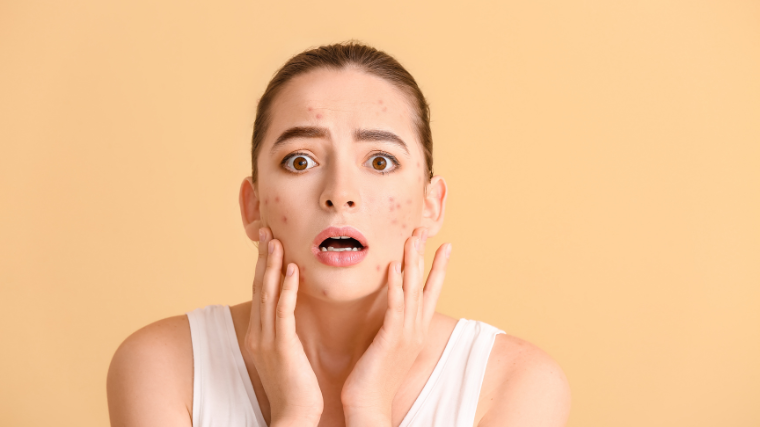If you’ve been diligently treating your acne but still see no improvement and breakouts continue, the issue might be your skincare habits. Some common routines can actually make acne worse. Here are 10 skincare habits that may be aggravating your acne, along with dermatologist-recommended tips to help you adjust these habits.
- Switching acne treatments too often
Trying a new acne treatment every week might seem like a good idea, but this can irritate your skin and potentially make breakouts worse.
What to do instead: Allow each acne treatment time to work. It usually takes about 6 to 8 weeks to start seeing noticeable improvement. Think of it like planting a seed—you need to give it time to grow before you see results. If you don’t notice any change after that period, you can consider trying a different product. Keep in mind that complete clearing of acne often takes 3 to 4 months, so patience is key.
2. Washing your face multiple times a day
Over-washing can also irritate the skin, potentially worsening acne.
What to do instead: Allow each acne treatment time to work by using it consistently for 6 to 8 weeks. This duration is usually needed to see noticeable changes. If there’s no improvement after that period, then consider trying a different product. Full clearing often takes about 3 to 4 months.
3. Not getting enough sleep and skipping exercise
When you don’t sleep well, it can increase stress, which makes the body release hormones that may lead to acne. Similarly, not exercising regularly can contribute to hormone imbalances, which are a common cause of breakouts.
What to do instead: Aim to get 7–8 hours of sleep each night to help your body manage stress levels better. Try to exercise two or three times a week to keep hormones balanced and reduce the risk of breakouts.
4. Sharing makeup, brushes, or applicators
Even with non-comedogenic products, sharing makeup can still lead to breakouts. Although acne itself isn’t contagious, sharing makeup items can transfer acne-causing bacteria, oil, and dead skin cells from others onto your skin. This can block your pores and lead to breakouts.
What to do instead: Use your own makeup, brushes, and applicators, and avoid sharing them with others.
5. Over-Washing Your Face
Washing your face too often can strip it of natural oils, causing more oil production and potentially leading to breakouts.
What to Do Instead:
Limit washing to twice a day with a gentle, sulfate-free cleanser to keep your skin balanced.
6. Skipping Moisturizer
Skipping moisturizer can leave your skin dehydrated, causing it to produce more oil, which may lead to acne.
What to Do Instead:
Use an oil-free, non-comedogenic moisturizer to maintain hydration and help regulate oil production.
7. Using Dirty Makeup Brushes
Dirty brushes can harbor bacteria and old makeup, which can clog pores and worsen acne.
What to Do Instead:
Clean your brushes weekly with gentle soap or brush cleaner to minimize bacteria buildup.
8. Using Hairstyling Products That Touch Your Skin
Hair styling products often transfer oils and residue onto your forehead, trapping acne-causing bacteria in pores, which can lead to clogged and inflamed pores, resulting in redness, blackheads, and whiteheads, especially along the hairline and forehead.
What to Do Instead:
Apply hair products carefully, avoiding your forehead, and consider non-comedogenic products. If you have bangs, try pinning them back when applying products or on days when acne flares up. Additionally, use targeted spray applicators or cover your face with a hand or cloth to minimize product landing on your skin.
8. Popping Pimples
Trying to pop pimples can push bacteria deeper into the skin, spreading the infection and causing more clogging, swelling, and redness, along with a higher risk of scarring.
What to Do Instead:
Resist the urge to pop. Instead, use acne patches or apply a spot treatment to help pimples heal faster without causing further irritation or scarring.
9. Rubbing sweat off your skin during a workout
Roughly wiping away sweat with a towel can irritate your skin and lead to breakouts.
What to do instead:
Use a clean towel to gently pat sweat off your skin while exercising.
10. Sleeping with your makeup on
Even non-comedogenic makeup can lead to acne if you don’t remove it before bed.
What to do instead: Always take off your makeup before going to sleep. If you’re too tired to wash your face, use a makeup remover wipe—just make sure it’s non-comedogenic.
When to Visit a Dermatologist
Many people can manage their acne by following these skincare tips and using over-the-counter treatments. However, if you’re still experiencing breakouts after trying these steps, dermatologist, Dr. Zainab Safderi, she can provide additional support. Some cases may require prescription-strength treatments.
With professional guidance, nearly everyone with acne can achieve clearer skin.

